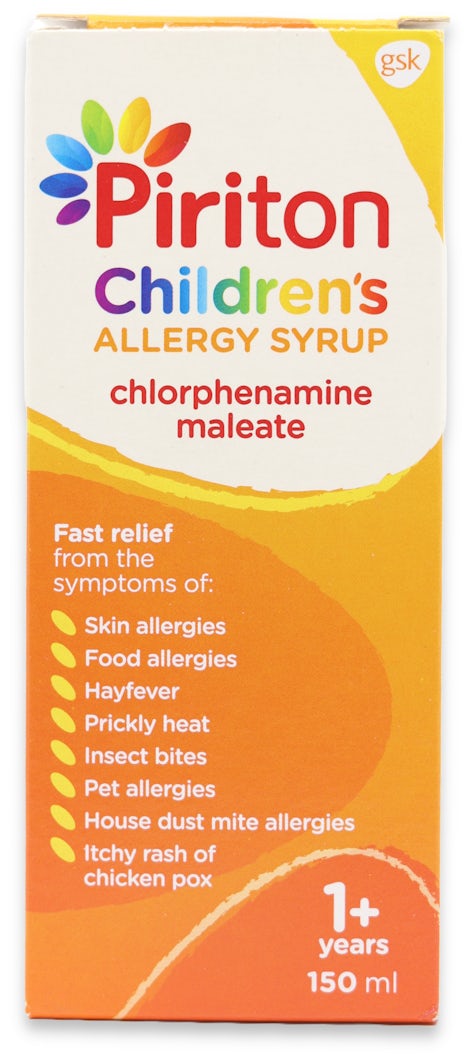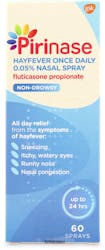Piriton Syrup 150ml
Piriton Syrup 150ml
What 500,000+ customers say about medino:
Description
Piriton Syrup is used to treat the symptoms of allergies, such as hay fever, itchy skin rashes, nettle rash, hives, skin allergies and dermatitis, prickly heat and heat rash, reactions to food, food additives or medicines, insect bites and stings, and the itchy rash of chickenpox.
Key features:
- Fast and effective relief for hay fever and allergies
- Relieves itchy skin, rash, and hives
- Can aid restful sleep when symptoms are troublesome
- Relieves symptoms of chickenpox
What is hay fever and what are its symptoms?
Hay fever, also known as allergic rhinitis, is a condition that causes cold-like symptoms such as a runny nose, itchy eyes, congestion, sneezing and sinus pressure. Unlike a cold, it is not caused by a virus but rather by an allergic response to a harmless substance such as pollen, dust mites or pet dander. Hay fever can greatly affect your daily life by making you feel miserable and interfering with your work or school performance. However, by identifying and avoiding triggers and finding the right treatment, you can effectively manage and alleviate the symptoms of hay fever.
What are some common hay fever triggers?
Hay fever, also known as allergic rhinitis, can be triggered by various allergens. Some common triggers include tree pollen, which is common in early spring, grass pollen, which is common in late spring and summer, and ragweed pollen, which is common in the fall. Additionally, dust mites and cockroach droppings can trigger hay fever year-round, while dander from pets can cause worse symptoms in winter when houses are closed up. Spores from indoor and outdoor fungi and moulds can also be both seasonal and year-round triggers for hay fever.
What is the active ingredient in Piriton Syrup?
The active ingredient in Piriton Syrup is chlorphenamine maleate, which is an antihistamine that helps to relieve the symptoms of allergies.
How does Piriton Syrup work?
Piriton Syrup works by blocking the effects of histamine, which is released by the body in response to an allergic reaction. By inhibiting histamine, Piriton Syrup reduces the symptoms of allergies, such as itchiness, sneezing, and a runny nose.
How quickly does Piriton Syrup start to work?
Piriton Syrup usually starts to work within 30 minutes of taking it. However, the exact time it takes to start working may vary depending on individual factors, such as age, weight, and the severity of the allergic reaction.
Can you take Piriton Syrup 150ml when pregnant?
Unfortunately, Piriton Syrup 150ml isn’t recommended while you’re pregnant. Even though there’s no firm evidence to say it could be harmful, there’s not enough information to be sure it’s safe.
To find out what hay fever treatments you can use when pregnant, check out our guide to hay fever when pregnant and breastfeeding.
How often can you take Piriton Syrup 150ml?
Adults and children over 12 years old can take two doses every four to six hours, and no more than twelve spoonfuls in 24 hours. If you’re over 65, you should chat to our pharmacist or your GP before taking Piriton Syrup 150ml, as you may need to take a lower daily dose.
When using as children's Piriton, be sure to stick to the dosage referenced on the packet and in the usage and instructions paragraph on this page.
Ingredients
What is the active ingredient in Piriton Syrup 150ml?
Piriton Syrup 150ml contains an antihistamine called Chlorphenamine Maleate, which blocks the histamines your body produces when you experience an allergic reaction.
Per 5ml dose, Piriton Syrup contains 2mg of Chlorphenamine Maleate.
Usage and Instructions
Oral administration only
Do not exceed the stated dose or frequency of dosing
The minimum interval between the doses should be 4 hours.
Do not use continuously for more than two weeks without consulting a doctor.
| Age Group | Dosage | Maximum in 24 hours |
|---|---|---|
| 1-2 years | One 2.5ml spoonful twice daily | Two 2.5ml spoonfuls (5ml) |
| 2-6 years | One 2.5ml spoonful every 4-6 hours | Six 2.5ml spoonfuls (15ml) |
| 6-12 years | One 5ml spoonful every 4-6 hours | Six 5ml spoonfuls (30ml) |
| Adults and children over 12 years | Two 5ml spoonfuls (10 ml) every 4-6 hours | Twelve 5ml spoonfuls (60ml) |
| Elderly | Two 5ml spoonfuls (10 ml) every 4-6 hours | Six 5ml spoonfuls (30ml) |
Not recommended for children below 1 year
Warnings
How long does Piriton Syrup 150ml make you drowsy for?
Piriton Syrup 150ml will usually make you feel a bit sleepy or drowsy. This effect usually wears off four to six hours after you’ve taken a dose.
What is the difference between Piriton and Piriteze?
Even though Piriton and Piriteze are both antihistamines, they contain different active ingredients. Piriton contains chlorphenamine maleate and Piriteze contains cetirizine. If you’re unsure which is best to use for your specific allergy symptoms, chat to our pharmacist who’s happy to help with expert advice.
Are there any other warnings?
Do not take Piriton Syrup if you are allergic to antihistamines or to any of the ingredients listed or if you have taken drugs for depression called monoamine oxidase inhibitors (MAOI) within the last 14 days.
Please see your doctor before you take Piriton Syrup if you have epilepsy, glaucoma, an enlarged prostate, an overactive thyroid, very high blood pressure, or heart, liver or chest disease. You should also see your GP if you are taking medicines to treat anxiety or to help you sleep or are taking any medicine containing phenytoin for epilepsy.
As with other antihistamines, the effects of alcohol may be increased.
This medicine should not be used during pregnancy, or breastfeeding, without seeking advice from a doctor. If the syrup makes you feel drowsy, do not drive or operate machinery.
If you forget to take the syrup, take a dose as soon as you remember unless it is nearly time to take the next one. Never take two doses together. Take the remaining doses at the correct time.
Side Effects
The most common side effect of Piriton Syrup and Piriton for kids is drowsiness. This drowsiness can be helpful if symptoms are particularly troublesome at night.
Occasionally some people, whether children or adults, may have difficulty concentrating; blurred vision; loss of appetite, indigestion or upset stomach, feeling or being sick; diarrhoea, tummy pain; liver inflammation (which may make you feel weak, sick and turn yellow); difficulty in passing water; headaches; dry mouth; dizziness, palpitations (feeling your heart beat), fast or irregular heart beat, low blood pressure (you may feel faint), chest tightness; thickening of phlegm; blood disorders (anaemia); allergic reactions including itchy rash, skin peeling, and sensitivity to the sun; twitching, muscular weakness and incoordination; ringing in the ears; depression (low mood); irritability or nightmares; children may become excited and the elderly may become very confused.
If you are concerned about these effects, or if the syrup affects you in any other way, stop taking it and talk to your doctor or pharmacist.





